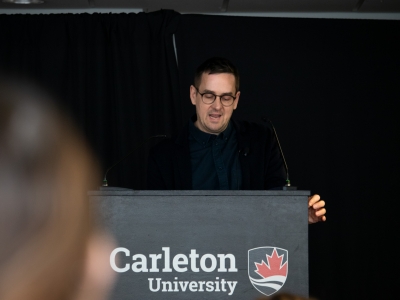For the conscientious coffee drinker, the grocery store shelf offers an array of options: fair trade, shade grown, organic, small batch, and more.
This is not unique to coffee. From the paper one buys for the home printer to the airline flight one takes to visit relatives or to rejuvenate on a vacation, consumer markets are now teeming with eco and social labels.
This proliferation of certifications and labels prompted Carleton University public policy and administration professor Graeme Auld to take a closer look at the motivation behind these stamps of approval. “Some sectors have a lot of these initiatives, and others have far fewer” he explains, “and I wanted to understand what was behind these patterns.”
In his recently published book, Constructing Private Governance: The Rise and Evolution of Forest, Coffee, and Fisheries Certification, Auld delves into the creation of environmental and social certification programs that were intended to promote responsible global business practices. “The organizations behind the labels and the certification standards can be quite different,” he explains, “ and I had a hunch that these differences mattered.”
The book draws on fifteen years of research, and includes interviews with officials who developed programs and are now running them, as well as extensive reviews of archives, policy documents, and news reports.
Auld’s hunch proved correct. The book reveals how the early decisions of programs on governance and standards affected the path along which they evolved and the variety and type of initiatives that developed in different sectors. For example, the Marine Stewardship Council decided early on to focus on sustainable capture fisheries. But this left fish farming unaddressed, creating an opening for the rise of new programs to certify and label aquaculture operations, programs such as the Global Aquaculture Alliance and more recently the Aquaculture Stewardship Council.
“There are a lot of these initiatives that now exist, maybe 100 to 200 if you look only at programs that operate in two or more countries and have third party certification,” Auld says.
Certification is not just about informing consumers. It is more and more an instrument used by major corporations – from Walmart to Unilever – to authenticate their sustainability claims. Auld hopes his book can contributes to debates about the potential of certification. “Since certification is increasingly turned to as an instrument to address global environmental and social problems, I hope my book will enlighten people interested in how certification works and how these initiatives might be made to work better in the future.”
Auld is currently a visiting associate professor in Canadian Studies and Political Science at Yale University.
Constructing Private Governance: The Rise and Evolution of Forest, Coffee, and Fisheries Certification is published by the Yale University Press and is available from Amazon.com.
Wednesday, November 5, 2014 in Faculty Publications, Groundbreaking Research, News, School of Public Policy and Administration
Share: Twitter, Facebook



